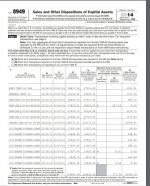Doubling the S&P is pretty good. My best year was a 65% gain and I never have more than $100,000 at risk in short term trades at a time. Most of my investments are longer term in tax deferred accounts. I keep the $100,000 trading account for fun, trim the profits to buy toys. I retired at 52 and just turned 67.
I have 11 pages of transactions if you want to see them. Don't like to be called a liar. Show me yours.
Holy.crap.
You just proved you don't know a damned thing about investing and you don't even know why.
So, let me explain a few things to you.
First, you are doing your day-to-day trading in a brokerage account rather than a qualified account? No intelligent person would do this. Because of the nature of your trades (ie: frequency) you are paying short term capital gains. If you were trading in a qualified account like this you wouldn't have that issue. You could very easily make a $100M qualified account, do your play trading there, and keep longer term investments in the brokerage account so as to not generate taxable events. The way you did it was just rookie stupid. I probably only sell one or two things a year in my brokerage account, largely because I don't want to incur the tax implications of a sale and pay 23.8% on it. As a result, a large portion of my holdings in the brokerage account are either ETFs designed for long term holds, long term individual positions, or K1 related securities so I can capture the pass thru advantage.
Second, you are trading in 3x leveraged ETNs. No educated/sophisticated investor would do that, none. I can't see precisely what index those are based on, but there is generally no reason to deal with it via an ETN. If you wanted the leverage, buy the derivative directly, don't play a game with an unsecured ETN that is rife with premium/discount/contango problems.
Third, you didn't even manage your wash transactions properly.
Fourth, you doubled the S&P 500 returns, great. However you did it taking 2x/3x unsecured derivative positions to do it. No portfolio manager on the planet calls that alpha.
Lastly, I note you posted 2014, odd year to pick for someone so successful. Most people would have chosen the most recent years of 2020 or 2019. More accurately, they would show a complete analysis of brokerage statements to show the entirety of the activity over a several year window. Taking a snapshot in time to make yourself feel good, if you think that is what this did, isn't hard.
My personal 1040 is pretty boring honestly, like I said, it is a lot of holding, not a lot of transactions. The bulk of my assets are held in trust and don't report on a 1040.

